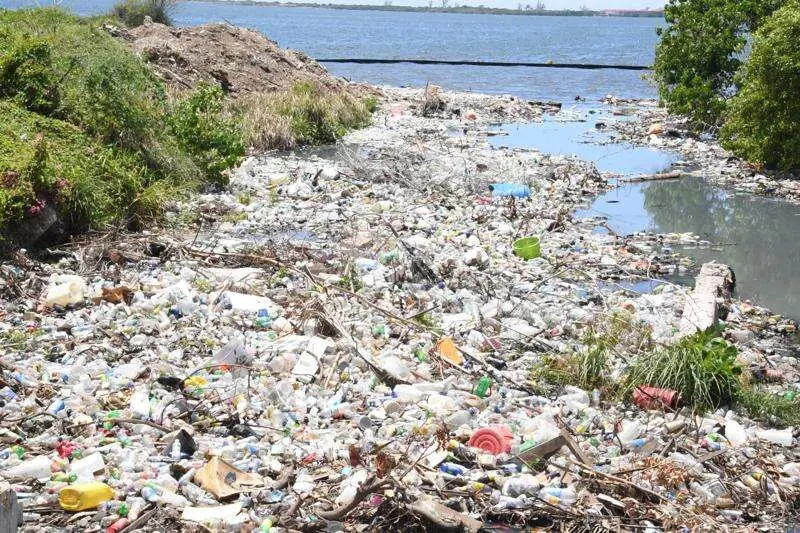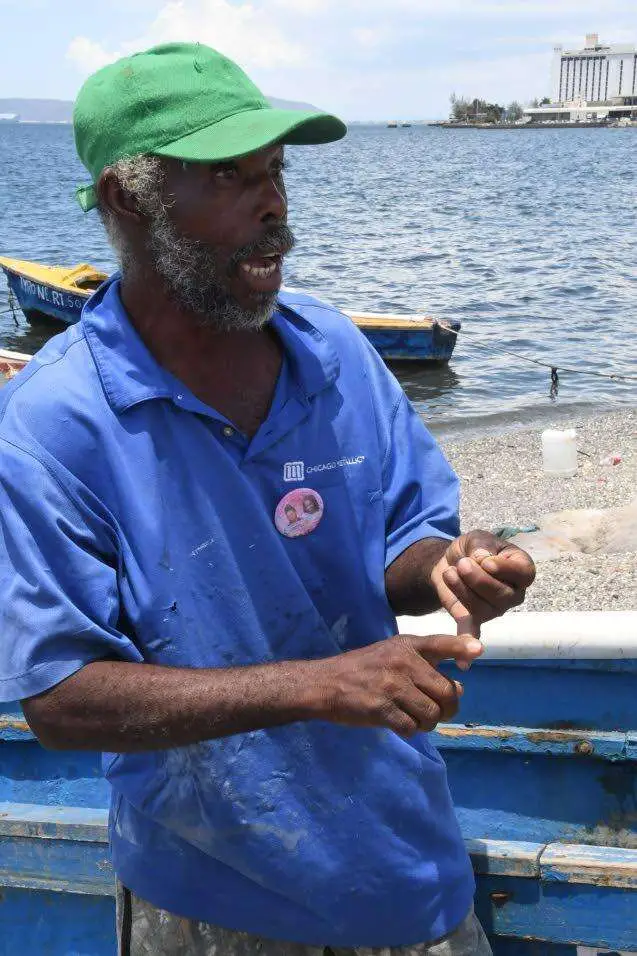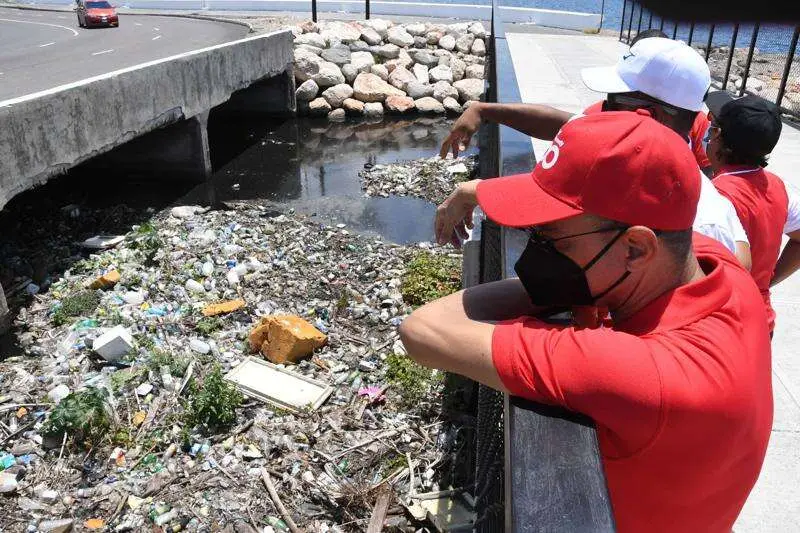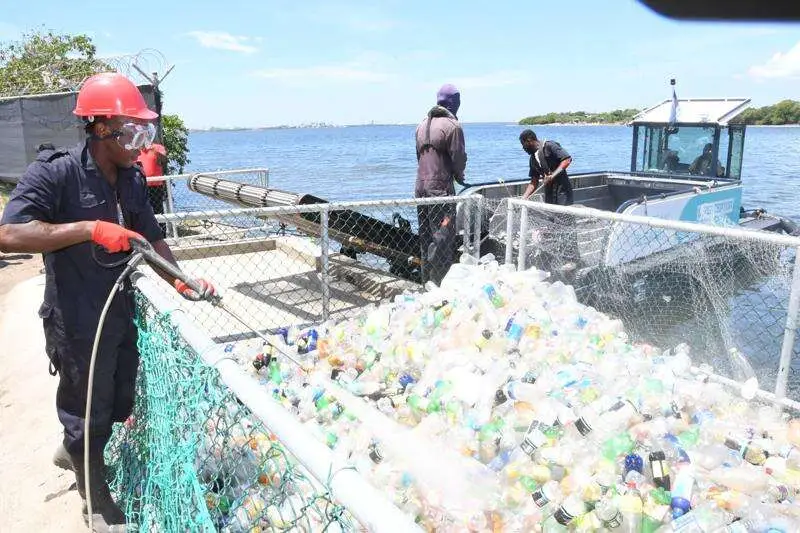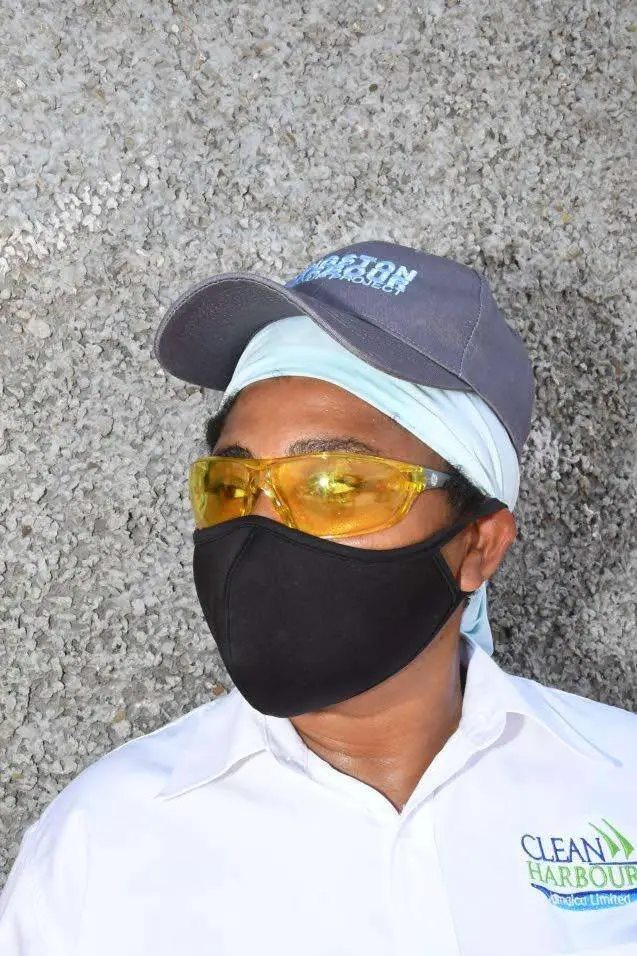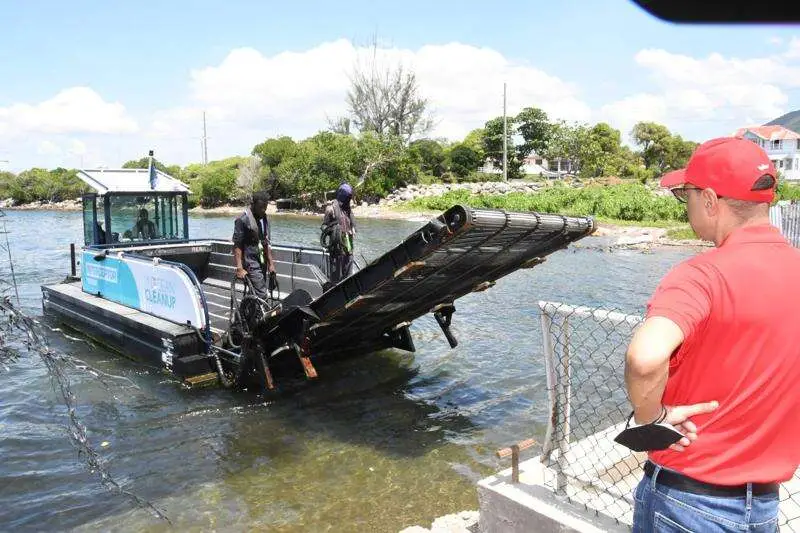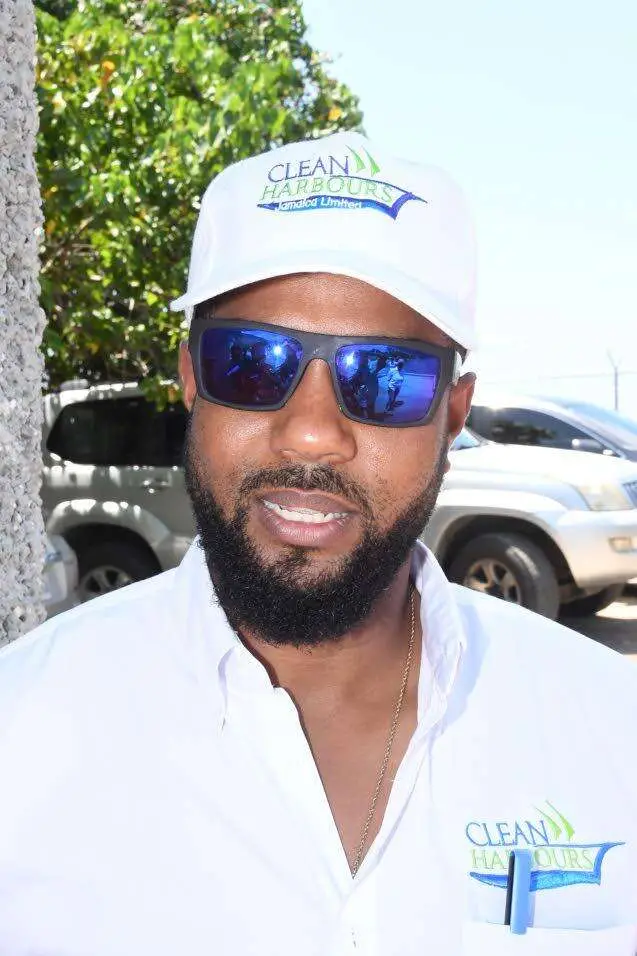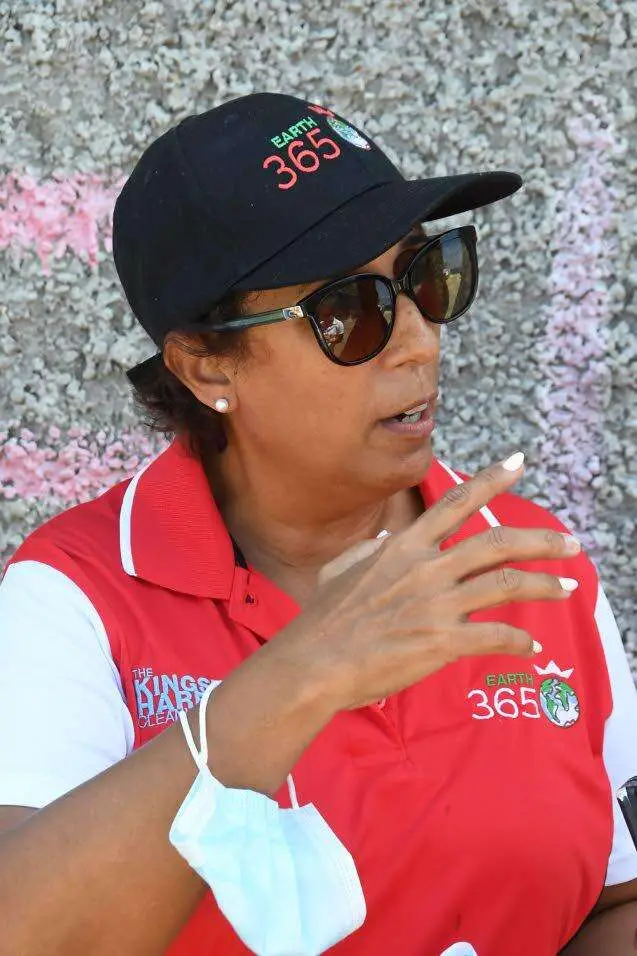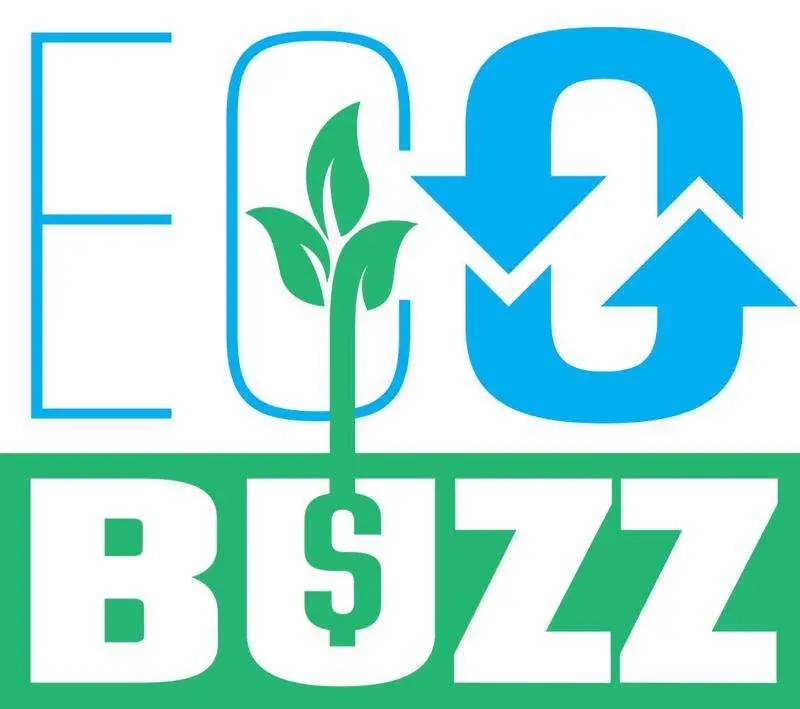
The start of a long journey
IN the mid-morning sun in downtown Kingston, Jamaica, Clive Davis, a fisherman whose face shows all his years, tends his boat on the edge of the Kingston Harbour where the Barnes Gully empties into the sea. Behind him in the background, two men throw fishing lines hoping for a catch.
In the gullies that were built to help drain the July to October seasonal downpour, solid waste now dominates and a noxious stench permeates the atmosphere at the approaches of downtown Kingston. The cause of the stench was easy to identify — standing water in the gully infused with garbage, which we were told is thrown in all along the winding paths of the gullies, some starting in the hills above Kingston.
In previous times much of this garbage would have found its way into the harbour. Some items still do. But now, at least a pilot project is underway to reduce, if not eliminate that altogether with the use of the Interceptor Barrier.
“There are three barriers in place right now,” Caroline Mahfood, CEO of the GraceKennedy Foundation, told the Jamaica Observer. The barriers are placed at the mouth of the Barnes Gully, the Rae Town Gully and the Kingston Pen Gully. Mahfood says there are plans “to expand it to 11 gullies, including the Sandy Gully, hopefully over the next two years”.
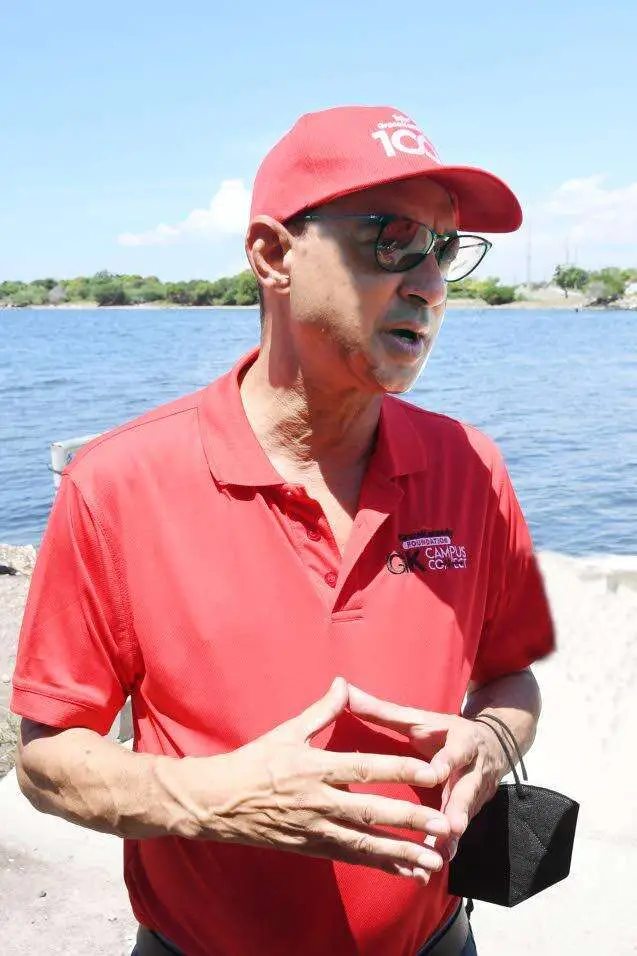
The barriers which were put in place in January of this year have intercepted at least 28 tonnes of solid waste — more than 60,000 pounds of garbage — from entering the harbour, Michael McCarthy, director of Clean Harbour Jamaica, told Sunday Finance. “Of that, 20 tonnes is from the Barnes Gully alone. The rest came from Rae Town and Kingston Pen,” he said.
A lot of the waste includes household appliances such as fridges, stoves, washing machines and microwaves. But it also includes furniture, mattresses, plants and plastic bottles.
“The garbage will be deposited here”, McCarthy continued as he pointed to a sorting site in east Kingston which we were told was donated by the Urban Development Corporation for the project. “We would then have the sorters separate the plastics from the non-recyclable waste. The non-recyclable waste is then placed in a private skip supported by the GDSS — Garbage Disposale and Sanitation Services — and that would then by taken to the dump, as it is our only current base to deposit garbage at the moment.”
“The plastic is separated, cleaned, sorted and bagged and sent to Recycling Partners of Jamaica, which is the main plastic recycler on the island.”
This project is funded by The Ocean Cleanup, a Dutch non-profit environmental organisation whose mission is to rid the oceans of plastic. The local implementation partners are the GraceKennedy Foundation and Clean Harbours Jamaica.
“The reason we are involved is that we know the pollution coming into the harbour is affecting shipping in a very, very negative manner. A lot of wood, a lot of everything that is affecting the ships. We know our fishers are suffering — their catch is getting smaller and smaller every year. The catch is full of pollution; we don’t know what our fish are eating. It’s not a healthy environment and we are invested in downtown, GraceKennedy is invested in downtown. We want our harbour clean,” Mahfood insisted.
Don Wehby, the GraceKennedy CEO himself, is invested in this project. When we visited on Thursday to assess the project so far, Wehby took time out of his busy schedule to be there as well, dressed down in jeans and a polo shirt.
Wehby said after sponsoring an environment chair at The University of the West Indies, Mona for 20 years, he was encouraged to do something about the solid waste entering the harbour through the network of gullies that criss-cross the capital.
“The task seemed monumental at the time, it’s big money,” Wehby said as he gazed at the ocean.”It’s going to require a lot of financial and human resources to get it right. So, this is just the journey and we are at the start of the journey. It’s going to take a little time to get it right. We really see downtown Kingston as the hub for economic activity with cruise ships there, and we are not going to realise that full potential unless we have a clean harbour. So there’s a lot of work to be done but at least we have started the journey, which is really important.”
But he said it will take more than intercepting the garbage to keep the harbour clean.
“What we really need is an educational programme [to encourage people to dispose of garbage properly]. That is going to require a cultural change.”
More than education, they are hoping that regular garbage collection will disuade people from dumping garbage into the gullies.
“Unless you have a good garbage collection system you can educate ‘until you are blue’, people are going to dump into the gullies. So, you have to have both in place. You have to have a solution for the collection of garbage so that people don’t want to dump,” Mahfood added.
She said the harbour clean-up project, however, involves environmental wardens who go into the surrounding communities to monitor garbage disposal.
As we speak, a Berky vessel arrives from the harbour. It is what is used to harvest the garbage from the interceptor barriers at the mouths of the gullies. It also transports the garbage to the sorting location.
“We actually separate the waste and log them. We log organics, metals, glass, plastics separately, and there is a sheet to help the pickers identify the types of waste,” Alecia Beaufort, operations manager for the project, told Sunday Finance.
“Our partners are interested in seeing not just volume, but also the type of waste coming down.”
The project covers the waterfront and the mouth of the gully, McCarthy told us as Clive Davis, the fisherman whom we encountered, complained about the stench which he blamed on the interceptor barriers, though he acknowledged that the project is important to prevent the garbage from entering the harbour.
“We have reached out to the municipality for help and, while they have assisted us, this needs a more systematic approach [to clean the gullies]. The help needs to continue and be more regularised; it can’t be long times in-between.”
“This here requires some engineering to solve the issues with the gully, because the barriers would be there and then the rain falls and everything rushes down — but when the rain doesn’t fall, it stays where it is and gets stagnant,” Deika Morrison, consultant with NDK Advisory and Consulting Limited, chipped in.
“This is a pilot and we are learning. There are a number of ideas being floated, including getting the fire department to help by asking them to spray high-pressure water to flush out the plastics near the end of the gully.”
While issues emerge, all agree it is a welcomed project, especially with private sector involvement.
“It is becoming more a public sector-private sector partnership in terms of the environment. Yes, the Government has a responsibility to put in place some infrastructure and some policies but I believe the private sector has a major, major role to play in terms of creating a proper environment for the future generations to come. That’s critical. That’s a key role for the entire private sector and that’s why the whole umbrella of ESG is going to become more and more important as we move forward,” Wehby added. ESG refers to environment, social and governance policies under which companies are being increasingly asked to operate.
“You know, some banks are not lending you any funds or giving you any funds unless you have a proper ESG policy, and executing on it and reporting on it to your shareholders. So if you look in GraceKennedy’s annual reports, we are actually one of the first Caribbean companies to publish an actual ESG statement and report to our shareholders what we are doing in terms of sustainability of our environment.”
GraceKennedy, through its foundation, has also started recycling in schools and at the workplace to which its staff take plastics from home for recycling.
“A part of the GraceKennedy 2030 Vision, as I’ve said publicly before, is to list on an overseas stock exchange — whether it be the New York Stock Exchange, the Nasdaq, or the London Stock Exchange — and you can’t even think about listing on those exchange unless you have a proper and robust ESG policy. But, we are ahead and we have consultants in place to help us along. In 2021 [it] was the first year we actually published our ESG statement in our report.”
For Davis, a cleaner harbour is needed quickly. He complains about lower fish catch and customers who turn away from purchasing out of concern for where the fish are caught. He is hoping the work will progress for his own livelihood.
“There is a lot of work to be done. This is the start of a long journey,” Wehby concluded.
